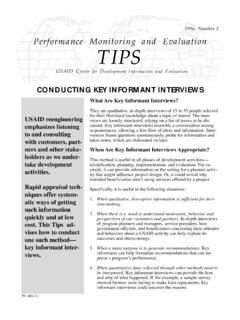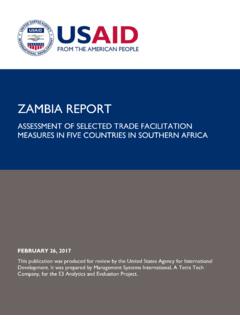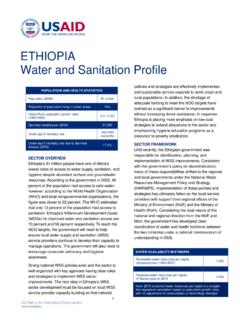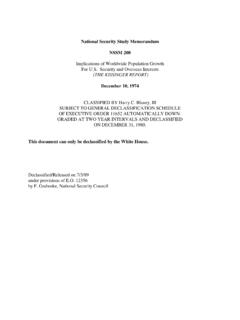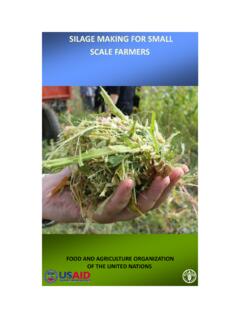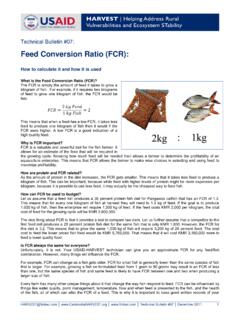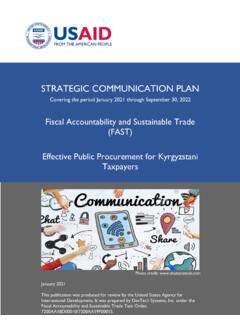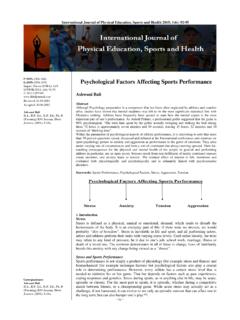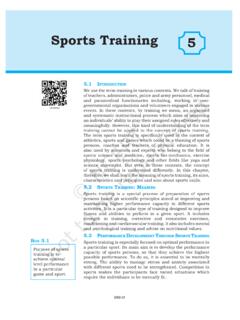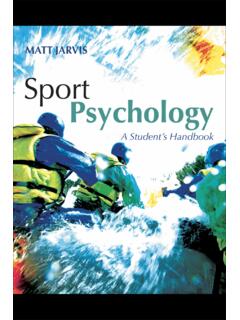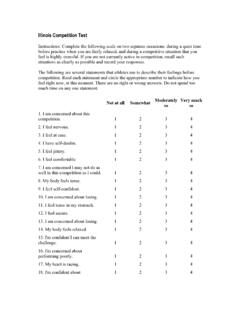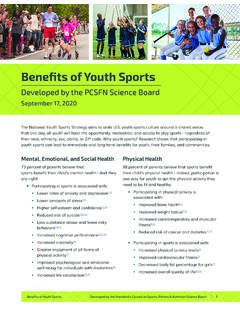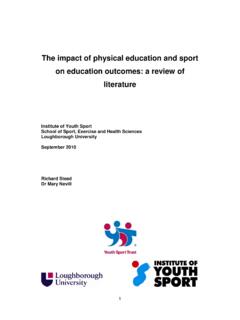Transcription of THE ROLE OF SPORTS AS A DEVELOPMENT TOOL
1 THE ROLE OF SPORTS AS A DEVELOPMENT TOOL This publication was produced by the Displaced Children and Orphans Fund. Additional copies can be ordered from USAID's DEVELOPMENT Experience Clearinghouse (DEC). To order or download, go to and enter the document identification number (PN-ADE-352 ).The DEC may also be contacted at 8403 Colesville Road, Suite 210, Silver Spring, MD 20910; tel 301-562-0641; fax 301-588-7787; e-mail Table of Contents Executive Summary .. 3 The Transformational Power of Sport .. 3 Sport as a Vehicle for DEVELOPMENT and Peace .. 4 Physical 5 Humanitarian Response .. 6 Reconciliation and Peace Building .. 6 Rehabilitation and Integration of Persons with Disabilities .. 7 Advocacy and Social/Policy Change.
2 7 Awareness Raising and 8 Economic 8 Pitfalls and Possibilities: Promoting Responsible and Effective Programming .. 9 Conclusion .. 12 Appendix I .. 13 Training and Capacity 13 Athlete DEVELOPMENT and 13 Material Support .. 13 Direct Implementation of SPORTS Activities .. 13 Facilitation of Partnerships .. 13 Appendix II .. 15 3 Executive Summary Sport has the capacity to transform the lives of It bolsters physical, psychological, emotional, and social well-being and DEVELOPMENT . At the same time sport plays a significant role in cultures and communities around the world. These factors alone justify investment in SPORTS programming. But there is also a growing understanding that SPORTS programs merit support because they are powerful vehicles for achieving broader goals, particularly in advancing DEVELOPMENT and peace agendas.
3 The DEVELOPMENT community has typically marginalized sport, viewing it as a relatively low priority among a host of needs and goals. Recently, though, an international movement has taken root that recognizes that sport does not have to compete with other DEVELOPMENT priorities but can instead be a powerful means for addressing them. The United Nations, the Inter-American DEVELOPMENT Bank, governments, the International Olympic and Paralympic Committees, non-governmental organizations, and corporate entities have banded together to think strategically about sport for DEVELOPMENT and peace. At the field level, dozens of programs have been harnessing the power of sport for physical education, humanitarian response, reconciliation and peace building, rehabilitation and integration of persons with disabilities, advocacy and social/policy change, awareness raising and education, and economic DEVELOPMENT .
4 Much work must still be done to fully link the international movement to practitioners in the field and to bring the sport and DEVELOPMENT sectors together. Carried out wisely, however, SPORTS programming has the potential to play an important role in fostering DEVELOPMENT and peace. The Transformational Power of Sport Both formal studies and a wealth of anecdotal evidence have demonstrated that participation in sport has countless benefits for individuals. Among the most obvious positive outcomes are improvements in physical health, such as weight control, strength building, increased flexibility, enhanced coordination and motor skills, improved cardiovascular health, and pain reduction. People who are physically active often tend to develop healthier lifestyles and better eating habits.
5 A second, but no less important, beneficial aspect of sport is the impact that it has on psychological and emotional healing and well-being. Sport provides a positive outlet for 1 This report will rely on the definition of sport put forth by the UN Inter-Agency Task Force on Sport for DEVELOPMENT and Peace: Incorporated into the definition of sport are all forms of physical activity that contribute to physical fitness, mental well-being and social interaction. These include play; recreation; organized, casual or competitive sport; and indigenous SPORTS or games. This definition is broad enough to encompass the wide range of needs and interests of individuals and communities around the world, whose desire and ability to participate in sport is influenced by their varied cultural traditions, age, gender, physical ability, and numerous other factors.
6 By maintaining a broad definition of sport, we increase possibilities for participation, particularly by marginalized groups, and for developing programs that are appropriately tailored to the populations and communities involved. 4stress and aggression. Participation in sport can help alleviate depression or anxiety . Physically active people also often experience enhanced self-confidence and improved self-image. There is also evidence that participation in sport improves concentration and mental functioning. Beyond what it contributes to physical, psychological and emotional well-being, sport also plays a significant role in healthy social DEVELOPMENT and interaction. Sport helps people learn how to set and achieve goals through discipline and hard work.
7 It nurtures the DEVELOPMENT of decision-making and leadership abilities, while teaching people to manage both success and failure. People who participate in sport have the opportunity to improve their communication skills and gain valuable experience in collaboration and teamwork. Sport brings people together who might not otherwise have a chance to meet and allows them an opportunity to share their experiences and work together toward a common goal. These social skills and experiences are readily transferable to other aspects of life and may improve a person s ability to succeed as a student, employee, community member, or advocate for a particular cause. Sport also provides an alternative to risky or anti-social behavior, creating sufficient structure, discipline, and incentive to keep some people away from drugs, violence, or criminal activity.
8 Sport as a Vehicle for DEVELOPMENT and Peace The use of sport to promote peace and DEVELOPMENT is not entirely new; the Olympics are a historic example of sport used for a higher purpose. However, until recently, sport has remained on the sidelines of mainstream humanitarian and DEVELOPMENT programming, considered a luxury in the context of other DEVELOPMENT objectives. Now, though, there is a growing understanding that sport does not have to compete with other priorities but can actually be a means for addressing them. The United Nations Task Force on Sport for DEVELOPMENT and Peace affirmed this notion, concluding in its 2003 report that sport offers a cost-effective tool to meet many DEVELOPMENT and peace challenges, and help achieve the MDGs [the UN s Millennium DEVELOPMENT Goals].
9 A nascent international movement is growing around the use of sport for DEVELOPMENT and peace, as evidenced by some of the following key events: $ In 2001, the Inter-American DEVELOPMENT Bank (IDB) announced it would use sport to promote economic and social DEVELOPMENT . $ Also in 2001, created a new position, Special Adviser to the Secretary General on Sport for DEVELOPMENT and Peace, and tapped former Swiss president, Adolf Ogi, to fill the post. Ogi is charged with identifying opportunities to use sport within UN programs and to build partnerships between the UN and SPORTS institutions. $ In 2002, Mr. Ogi and Ms. Carol Bellamy, Executive Director of UNICEF, convened the United Nations Inter-Agency Task Force on Sport for DEVELOPMENT and Peace to 5discuss experiences and lessons learned and make recommendations regarding the use of sport by UN programs.
10 $ In February 2003, the first International Conference on Sport and DEVELOPMENT passed the Magglingen Declaration, affirming delegates commitment to sport for DEVELOPMENT and peace and calling on others to support the movement. Numerous other international conferences have moved the discussion forward. An International Working Group will spend the next four years identifying best practices and guidelines for sport for DEVELOPMENT and peace. $ On November 3, 2003, the UN General Assembly passed resolution 58/5 encouraging governments to use sport to advance their DEVELOPMENT and peace and declaring 2005 the International Year of Sport and Physical Education. $ The International Olympic and Paralympic Committees have both made commitments to support the use of sport for DEVELOPMENT and to improve the lives of people living in the most disadvantaged regions of the world.
